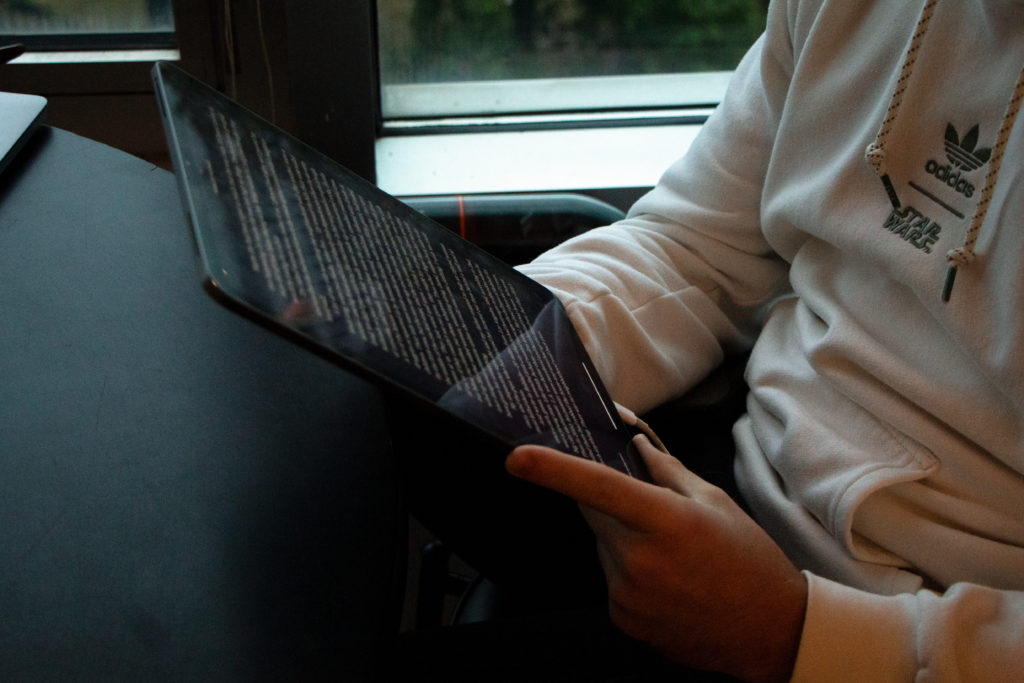Moments before her students arrived at her new biology course, adjunct professor Rachel Canalichio raced to call Gelman Library staff because her class textbook had disappeared from the library’s free academic resources webpage.
Canalichio’s Biology of Horticulture course centers around “Science and the Garden: The Scientific Basis of Horticultural Practice,” a free e-book that used to be available to more than a dozen students in the class through Gelman Library Services. But after Wiley, the book’s publishing company, revoked Gelman’s access to the textbook in August, Canalichio said she had to reorganize her entire syllabus to prevent her students from having to pay out of pocket for their required class textbook.
“I developed this whole class kind of based on this textbook because I really wanted to be able to provide a free e-book for the students,” Canalichio said. “They already paid so much.”
At least 300 students will lose access to their free class e-books after Wiley removed 1,380 titles from Gelman Library’s free resources in August, possibly forcing students to pay hundreds of additional dollars for their required class materials, according to The Hatchet’s analysis of the course catalog and syllabi. Officials said at least five courses used a textbook that Wiley pulled at the end of August.
Faculty who teach with the textbooks that Wiley removed said they want to provide their students with free or affordable textbook options, but issues like copyright and Wiley’s textbook removal create more barriers to material affordability.
Canalichio said when she found out Wiley removed the book and called the publishing company to figure out how to access the e-book, the publishing company did not provide any solutions.
“It was pretty clear that they just couldn’t have cared less,” Canalichio said.
She said she wanted to offer her students free textbooks through Gelman Library, but with the class’ textbook now behind a Wiley paywall, Canalichio – a manager at the biology department’s greenhouse – said she scrambled to use the greenhouse sales revenue to pay for used copies of an older edition of the textbook.
Canalichio said the textbooks she ordered to replace the e-book didn’t arrive until three weeks after the e-books removal, leaving her 15 students unable to read course materials during that period. She said physical copies of the free e-book she used cost about $90 and were only printing on-demand, which set back their ultimate arrival.
“The material in the second edition is a little bit outdated, but not too bad,” she said. “But it is totally unorganized from what I base my syllabus around.”
Geneva Henry, the dean of libraries and academic innovation, said publishing companies normally offer universities alternative options to purchase the removed books, but Wiley’s “predatory” behavior will force more students to individually buy textbooks, increasing the company’s profits.
“As students, you’re sort of a captive audience,” Henry said. “If the instructor says this is the textbook, you have to either buy it or do something else to try to get a hold of that material.”
Henry said students have access to thousands of titles from ProQuest’s Academic Complete e-book collection through the University’s subscription with the Washington Research Libraries Consortium, a nonprofit organization that provides academic materials to local universities. She said ProQuest negotiated a deal with Wiley to retain access to the Wiley e-books through August, but neither company notified her of the date of the final removal, leaving her unable to notify faculty that their students would not have free access to some of their course materials.
Henry said at least five courses and at least 300 students used the removed e-books, and the library staff “scrambled” to reserve print versions of the removed e-books already in GW’s supply for students in the five affected courses.
She said the Society and the Environment course – which has 269 students – that used the Wiley removed e-book “An Introduction to Human-Environment Geography: Local Dynamics and Global Processes,” will struggle to share a single physical, free copy of the book in GW’s library system. A digital version of the book is available for purchase through the GW Campus Stores for $31 through Wiley.
“Courses are underway, and you’re asking a faculty member to basically sort of rethink how they’re going to do their course,” Henry said. “And that’s hard to do.”
Henry said to make academic materials more accessible, students should encourage their professors to adopt open-access materials and free academic resources like textbooks that faculty members author and own the copyright license to.
Officials awarded grants to eight professors in April who will adopt free, open-source materials for classes taught between fall 2022 and fall 2023 in the Adapting Course Materials for Equity Faculty Grant.
“Please talk with your librarians,” Henry said. “They’ll work with you on this, but the more vocal the students are in letting the faculty know that ‘We know there are alternatives out there,’ please do that because you’re hurting us. I mean, we can’t afford this.”
Wiley spokesperson Ed Colby said the publishing company notified ProQuest, which provides GW Libraries with academic materials, of its plans to remove the titles in June 2020, giving them an “ample” notice of the Aug. 31, 2022 removal date two years in advance.
Colby said Wiley added 1,380 e-books to ProQuest’s “robust collection” in June. Henry said Wiley’s addition of titles in June “are not all textbooks,” even though they accounted for the majority of the books that the company removed at the end of August.
“Wiley remains committed to providing students with affordable e-books through our inclusive access and course materials affordability programs,” Colby said in an email.
Faculty who used the removed e-books as course materials said they have replaced them with scanned chapters of the removed books from the library and open-access materials.
Jeffrey Blomster, a professor of anthropology, said he lost access to “The Aztecs,” a textbook he uses in his Aztec Empire course. He said he doesn’t understand why Wiley removed the book because it was published in 2012, and the author has not released a new edition.
“I guess I would understand it more if it was a hot-off-the-press kind of book that they really, of course, want students to buy, but that’s not the case at all with this book,” Blomster said.
A digital version of “The Aztecs,” can be purchased for $38 through the GW Campus Stores through the Wiley Publishing Company.
He said Gelman Library reserved a physical copy of the book for his class of 16 students and scanned one of the “substantial” chapters for students to use. He said the library cannot scan the entire book for students’ digital use due to copyright restrictions.
Blomster said he teaches art history courses that tend to have cheaper textbooks than STEM courses, but he doesn’t want to require his students to buy a book.
“I do feel really committed to making sure that students in my classes don’t have to buy a book if they don’t want to,” Blomster said. “I’m not in the business of selling books.”








